220 – Choosing a Clinical Supervisor
Equality and Diversity in Counselling – Counselling Millennial Clients
In Episode 220 of the Counselling Tutor Podcast, your hosts Rory Lees-Oakes and Ken Kelly take us through this week’s three topics:
- In ‘Counselling Foundations’ Rory and Ken look at equality and diversity.
- Then in ‘Focus on Self’, we'll be thinking about supervision and being sure you have the right clinical supervisor for you.
- Lastly in ‘Practice Matters’, Rory speaks with Amy Launder about counselling millennial clients.
Equality and Diversity in Counselling [starts at 2:23 mins]
Equality and diversity is an ever-changing subject that can be difficult to keep on top of, but it is vital to be aware of.
The key points of this discussion include:
- The 2010 Equality Act, while important, isn’t where your knowledge of equality and diversity should end.
- Challenges your frame of reference – we are people of our time and will be faced with things we may not have considered before now, or that feel unfamiliar.
- The importance of CPD - continuing your professional development as the name suggests.
- Your core training, although important, is just facts that will require developing.
- Ask questions to help you evolve.
Free handout download on Equality and Diversity in Counselling is available in the green button above.
Choosing a Clinical Supervisor [starts at 16:07 mins]
Clinical supervision is a vital aspect of your career as a counsellor and you want to make sure you're getting as much out of it as you possibly can.
The key things to think about are:
- Choose your own clinical supervisor if you are able to – you’re more likely to be honest and not hide clients if you’re happy with your supervisor.
- Consider choosing a supervisor that challenges you – helps you to grow and maybe suggests areas for CPD.
- See who you find you connect with, have a pre-meeting with multiple supervisors and feel free to choose the one you feel suits you best.
- Ask questions about how they might supervise you in certain situations.
- When choosing a clinical supervisor, make sure they understand the modality you work under.
Counselling Millennial Clients [starts at 32:55 mins]
This week, Rory speaks with Amy Launder on counselling millennials, a term used to refer to people born between 1981-1995 (or some say up until 2000).
The important points of this discussion include:
- Something commonly brought to therapy by millennials is trouble with decision-making – this is usually due to parents making decisions for them.
- They might have been affected by events that influence how safe they feel (e.g. 9/11) as these events would’ve been well publicised.
- Generational distress – lack of distress tolerance, struggle to deal with boredom, want ‘quick fixes’ for their problems.
- Be aware that this does include a degree of stereotyping, and millennials do have a wider field than others (some millennials may even have millennial parents for example).
- Some of the languages they use may be different – ‘talking to someone’ doesn’t necessarily mean face-to-face anymore due to technology.
- Boundaries may be harder to establish with millennial clients – they may overshare or message you outside of session hours. A way to deal with this would be to show them they’ve been heard, but make them aware they need to hold onto it until their next session.


